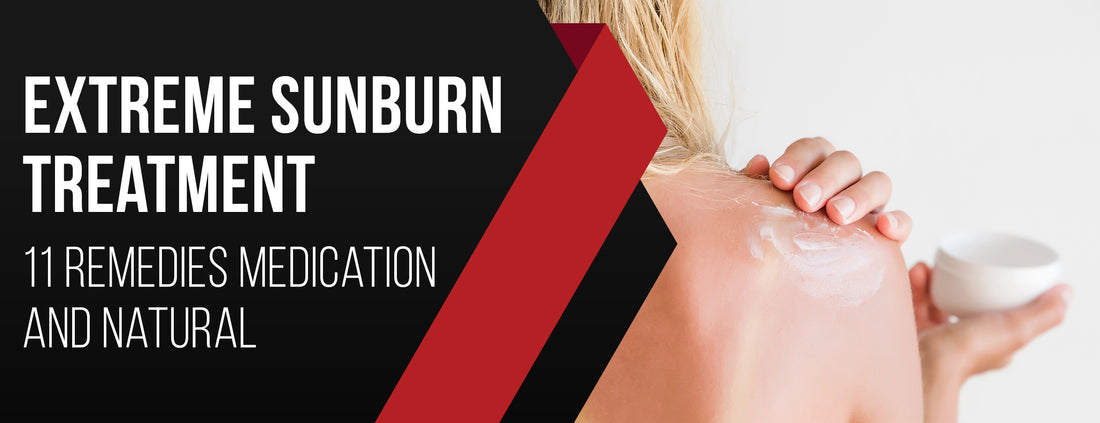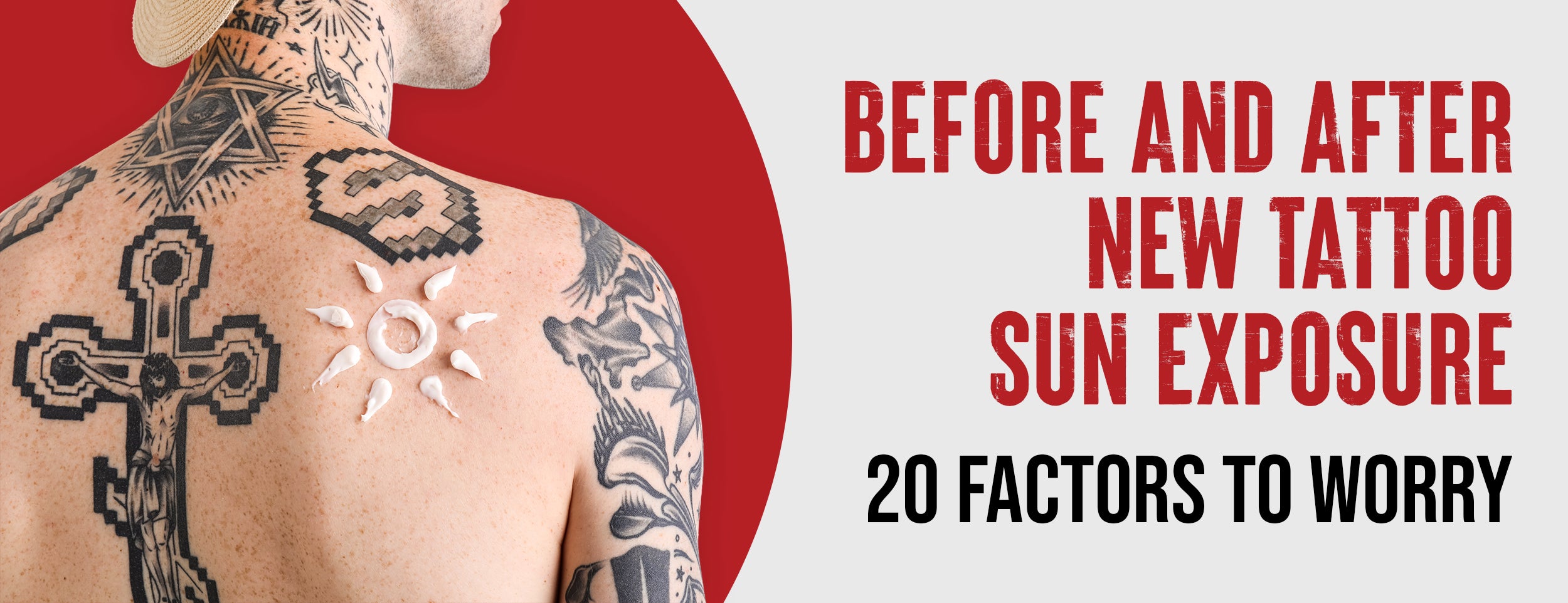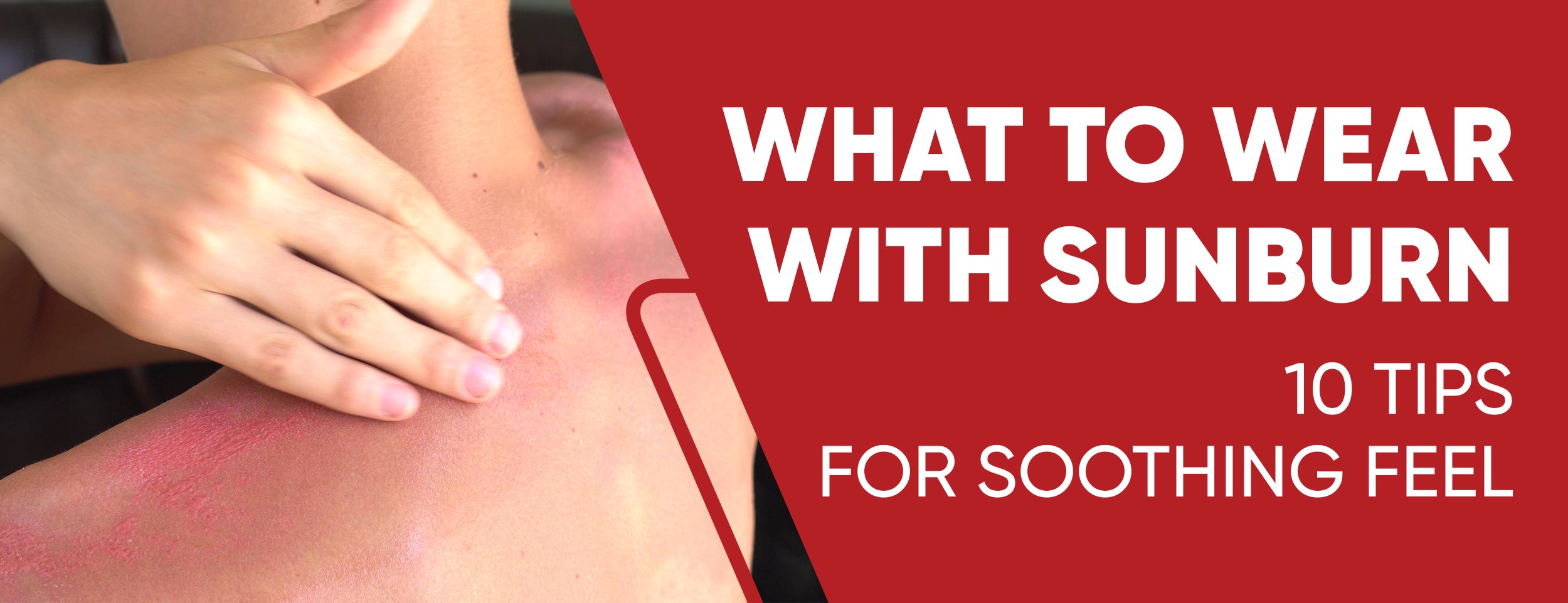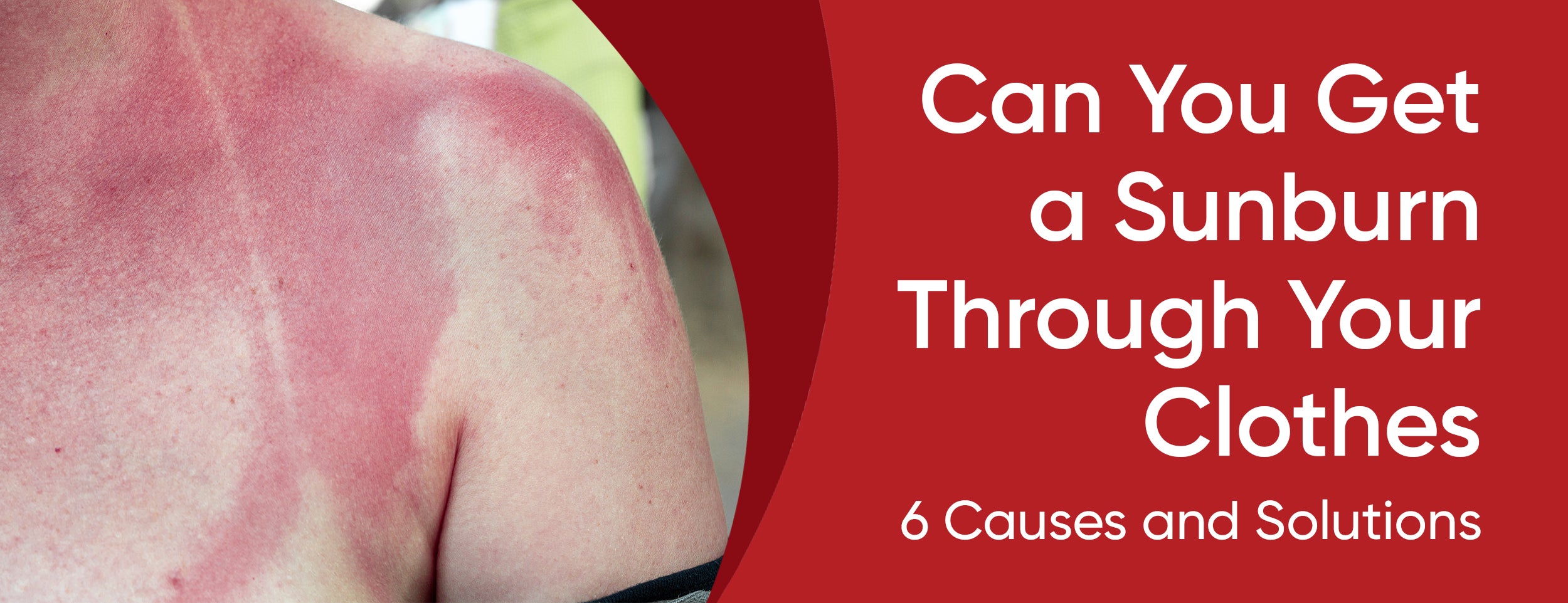Extreme sunburn can range from mild redness to severe burns, affecting the entire body. The consequences go beyond short-term discomfort, leading to premature aging, increased skin cancer risk, and even mental health issues. Prompt treatment is crucial to minimize risks and prevent complications like infection.
Avoid the sun as soon as possible. Cool your skin with a cool shower or bath. After sun, cream or spray should be applied. Cool down and prevent dehydration by drinking plenty of water. Take paracetamol or ibuprofen for pain relief.
In this blog post, we'll explain the steps to treat extreme sunburn so you can enjoy the rest of your summer without discomfort and what to avoid.
Extreme Sunburn Treatment: 11 Remedies

Extreme sunburn can be excruciating, and if left untreated, it can also cause blistering, peeling, and other serious health issues. You can use several tips to treat extreme sunburn and ease discomfort.
Medications Treatment for Extreme Sunburn
For extreme sunburn treatment, healthcare professionals often prescribe topical medications. Direct application of these medications relieves the pain and inflammation of the skin and can offer relief from pain and inflammation and promote healing. Here are some of the most common topical medications used to treat extreme sunburn:
- Pain Relievers: Extreme sunburns can cause significant pain and discomfort. Ibuprofen and acetaminophen are pain relievers that can reduce sunburn pain. These over-the-counter drugs should be taken as directed on the label.
- Antibiotics: Severe sunburns can lead to secondary skin infections. A prescription for antibiotics may be given in order to treat these infections. Following the prescribed dosage and finishing the entire course of antibiotics is essential to prevent antibiotic resistance.
- Topical Steroids: Topical steroids are pain relief medications injected under the skin to reduce itching, pain, and swelling associated with sunburn.

Home Extreme Sunburn Treatment
Severe sunburn can be a painful experience, causing redness, swelling, blisters, and even fever. But you don't have to suffer in silence - there are some effective home remedies you can try to ease the pain and promote healing.
- Aloe vera Gel: This natural remedy offers soothing properties and reduces pain and inflammation. Look for products that contain at least 90% aloe vera.
- A cool Compress: Can provide instant relief when applied to the affected area. The sunburned skin should be treated with a cool cloth soaked in water for 10-15 minutes.
- Apply a Moisturizer, Lotion, or Gel: After cooling the skin, moisturize, lotion, or gel, such as aloe vera, to soothe the sore skin and promote healing.
- Drink Extra Water: Sunburn can dehydrate your body, so it's vital to replenish fluids by drinking extra water for a day or two to help you recover.
- Treat Sunburned Eyes: If you experience discomfort in your eyes after sunburn, wear sunglasses, use cool compresses, and avoid rubbing them. See a doctor if you experience extreme pain, discomfort, or vision changes.
- Cool the Skin: Showers or baths can help relieve the heat and soothe the skin. Avoid using ice, which can damage the skin and cause more pain.
- Protect Yourself from Further Sun Exposure: Stay out of the sun and wear sun-protective clothing like hats and sunglasses to prevent further damage. Use sunscreen with an SPF of at least 15, and remember to reapply every two hours. Stay inside from 10 am to 4 pm when the sun's rays are strongest.
Treatment of Extreme Sunburn: What to Avoid?

Extreme sunburn treatment is crucial to inform readers about what to avoid when treating burns. Sunburns that are neglected or improperly treated can lead to severe complications, including skin damage, infections, and even skin cancer. Thus, taking precautions when dealing with an extreme sunburn is critical.
Don't Use Hot Water
One common mistake people make when treating sunburns is using hot water. Hot water can cause further irritation and damage to the skin, leading to blisters and peeling. Instead, use cool water to soothe the skin.
Don't Pop Blisters
Blisters may develop into severe sunburns, tempting you to pop them. This is a bad idea as popping blisters can lead to infections, scarring, and further damage to the skin. Let the blisters heal on their own.
Avoid Topical Products With Alcohol or Benzocaine
Alcohol and benzocaine are commonly found in topical products, such as sprays and gels, marketed for sunburn relief. These ingredients can cause further irritation and dry the skin, worsening the sunburn. Look for products with aloe vera or hydrocortisone instead.
Avoid Hot Showers and Baths
Many of us have experienced the relief and relaxation of a hot shower or bath. However, for treating an extreme sunburn, this is something that should be avoided at all costs. Hot water can further damage the affected area and exacerbate the pain. Therefore, it is recommended to take cool showers or baths.

Avoid Specific Medications
Certain medications can negatively affect the healing process of an extreme sunburn. Several commonly prescribed drugs, including Ibuprofen and Aspirin, can cause blood thinning, leading to further complications. Topical medicines containing benzocaine or lidocaine can cause an allergic reaction, worsening sunburn. Therefore, it is always advisable to consult a doctor before taking any medication.
Avoid Using Lotions with Fragrances
Although it may tempt you to use a lotion or cream with a pleasant smell, fragrances can irritate the affected area and cause more harm than good. It is best to use unscented lotions or creams that contain aloe vera or soy to moisturize the skin and promote healing.
Avoid Tight-Fitting Clothes
Wearing tight clothes over an extreme sunburn can cause added discomfort and even further damage to the skin. Therefore, it is recommended to wear loose-fitting clothes crafted with natural fabrics like cotton or linen. This will allow the skin to breathe and promote healing.
Avoid Picking or Scratching the Affected Area
Picking or scratching an extreme sunburn can lead to infections and scarring. It is essential to resist the urge to rub or peel away any blisters that may appear. Instead, keep the affected area clean and dry to prevent further complications.
Avoid Exposing the Sunburn to the Sun
This may seem obvious, but it is crucial to avoid exposing an extreme sunburn to the sun. Sunburned skin is already damaged and vulnerable; additional exposure can lead to even more damage. It is recommended that you stay indoors or under a shaded area until the sunburn has healed completely.

Conclusion
While sunburns are never fun, the good news is that they are almost always preventable. Using sunscreen, covering up when necessary, and steering clear of prolonged periods of direct sunlight are all effective ways to minimize the damage.
But when prevention fails, it's essential to take sunburns seriously and seek immediate treatment, especially if they are severe. From cold compresses to over-the-counter pain relief, plenty of at-home remedies can help.
In extreme cases, it's essential to seek medical attention right away. Whether it's blistering, swelling, or even fever, these are all signs that you need more than just lotion. Knowing the risks. And taking proactive steps can ensure your summer fun is comfortable, safe, and sunburn-free.












![How to Cover Sunburn With Makeup: 15 Ideas [Easy Solutions]](http://drnumb.com/cdn/shop/articles/How_to_Cover_Sunburn_With_Makeup__15_Ideas_Easy_Solutions.jpg?v=1705581434)


